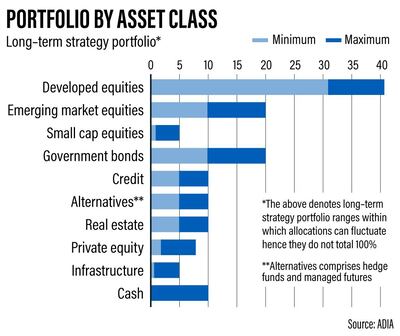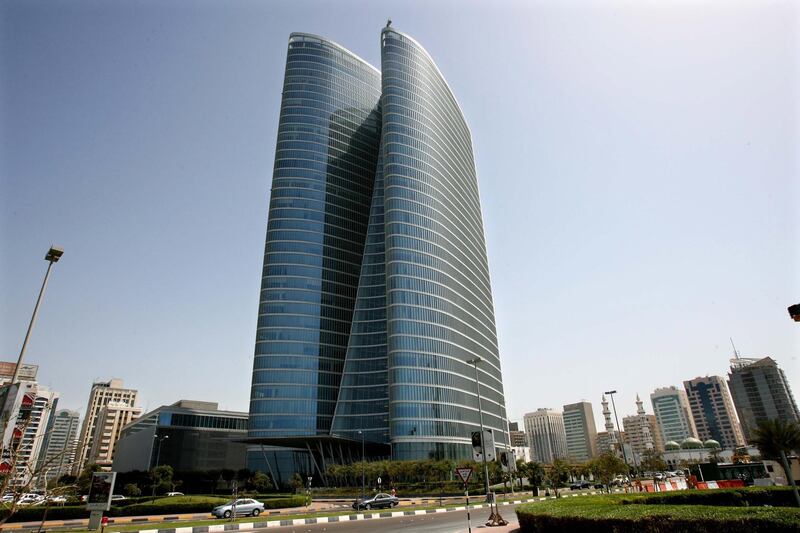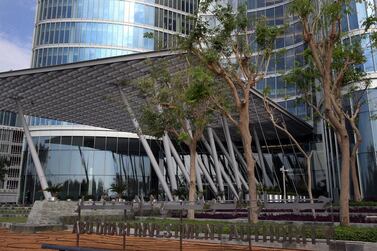Abu Dhabi Investment Authority (Adia), one of the world's biggest sovereign wealth funds, sees China and India as key drivers of global growth in the coming years and African countries ripe for investment.
The fund is also betting that technology advancements and climate change will lead to new and sustainable investment opportunities, its said in its 2019 annual report on Tuesday.
"On a geographic basis, we continue to see China and India as key drivers of global growth in the years to come," Sheikh Hamed bin Zayed Al Nahyan, Adia's managing director, said. "With an abundance of natural resources and young, growing and increasingly educated populations, African countries are among those offering the greatest potential for long-term investors."
Adia, which does not disclose its assets, invests on behalf of the Abu Dhabi government and is the third-biggest sovereign fund – after Norway and China – according to the Sovereign Wealth Fund Institute. It holds directly, or through its subsidiaries, investments across various asset classes including equities, fixed income, real estate and private equity.

The fund is eyeing renewable energy assets to generate more returns.
"At Adia, we view climate change as an opportunity," Sheikh Hamed said. "We already routinely incorporate climate change considerations into all of our investment proposals, and have been steadily expanding our exposure to renewable energy."
Adia, through its Infrastructure Division, has invested in platforms that generate more than 15 gigawatts of renewable energy around the world, according to the report.
This year, it developed a new mandate that "aims to integrate climate change considerations into portfolio construction, while delivering returns with a low tracking error." A pilot for this climate change portfolio has been approved and implemented.
The fund sees tech advancements, such as machine learning and artificial intelligence, as a means to process financial data more efficiently and identify "an unprecedented range" of new investment opportunities.
"Looking ahead, advances in technology are likely to bring the greatest changes to the investment industry in the decade to come," Sheikh Hamed said.
"Adia continued in 2019 to deliver on its mission of prudently managing capital on behalf of the government of Abu Dhabi," Sheikh Hamed said. "With a portfolio that is highly diversified, both across regions and asset classes, Adia has successfully managed across market cycles to produce sustainable, long-term returns for the benefit of Abu Dhabi."
Adia's 30-year annualised rate of return at the end of 2019 reached 6.6 per cent compared with 6.5 per cent the year before, according to the report. Its 20-year annualised rate of return reached 4.8 per cent, compared to 5.4 per cent in 2018, as a result of the exclusion from the rolling average of strong gains in the late 1990s.
"When looking back over the past decade, it is impossible to overstate the impact of, and subsequent response to, the global financial crisis of 2008-2009," Sheikh Hamed said. "The unprecedented stimulus provided by central banks revived global growth, reinforced the stability of our financial system and underpinned financial markets. Low inflation and interest rates have generated strong demand for financial assets, with listed corporations buying back their shares and liability-driven investors buying long-term debt instruments."
Concerted action by central banks and governments across the world cushioned the impact of the pandemic on banks and averted a credit crunch similar to the 2008 global financial crisis. Governments around the world, including those in the Gulf region, rolled out more than $12 trillion in fiscal stimulus, with central banks providing $7.5tn in monetary support.
Looking ahead, Adia expects the global economy to slow down with a corresponding impact on investment returns, due to the Covid-19 pandemic. It also sees risks remaining from continued trade tensions.
"In 2020, markets continue to be vulnerable to unexpected risks, as evidenced in the first quarter of the new year with the response to the outbreak of the Covid-19 coronavirus," the fund said in its report.
Adia's real estate division will continue to focus on emerging markets in the coming years, particularly China, India and Latin America, it said.
"The growing consumer class in these markets, combined with a scarcity of quality space across sub-sectors, is likely to provide a range of attractive opportunities," the report said.
In the first few months of 2020, and with the backdrop of the Covid-19 pandemic, Adia's private equity division provided expansion capital to new and existing portfolio companies in the financial services space and also made investments in the software and industrial services sectors, the report said.
The department "continues to seek opportunities in the healthcare sector, with a particular focus on specialty pharma, medical technology, healthcare IT and healthcare services," it said. The department is "optimistic" about growth and long-term profitability in various technology sectors.
As of 2019, Adia employed 1,700 people, the report showed. Its portfolio was divided between 55 per cent active management and 45 per cent passive management. About 45 per cent of its portfolio was managed internally and 55 per cent managed externally.








